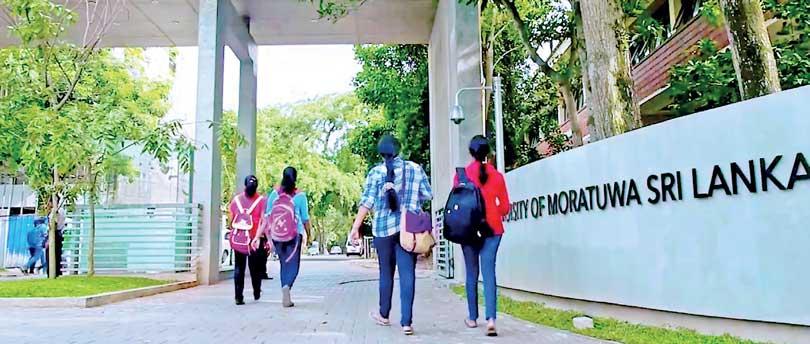08 Aug 2024 - {{hitsCtrl.values.hits}}

The newly proposed NEPF seeks to repeal the Central Government’s constitutional authority to establish and maintain universities, transferring this responsibility solely to the Provincial Councils
|
The NEPF for the period of 2023-2033 blatantly disregards the country’s Constitution The Yahapalana government’s attempt to alter this model failed and is now a part of history; however, years later, the same principle has been endorsed as the ideological stance of the NEPF |
 The newly proposed National Education Policy Framework (NEPF) for the period of 2023-2033 is unusually exceptional for several critical reasons. It blatantly disregards the country’s Constitution with clauses that directly violate its provisions. It advocates for the establishment of autonomous Provincial Boards of Education, which, according to the Constitution, should only have an advisory role. Furthermore, it seeks to repeal the Central Government’s constitutional authority to establish and maintain universities, transferring this responsibility solely to the Provincial Councils, which have not managed such tasks in the past 36 years since their inception. Shockingly, it is claimed to be based on the “Principle of Subsidiarity,” challenging the unitary status of the country. Additionally, it openly acknowledges its ideological stance of weakening the Center by devolving more power to the Provincial Councils.
The newly proposed National Education Policy Framework (NEPF) for the period of 2023-2033 is unusually exceptional for several critical reasons. It blatantly disregards the country’s Constitution with clauses that directly violate its provisions. It advocates for the establishment of autonomous Provincial Boards of Education, which, according to the Constitution, should only have an advisory role. Furthermore, it seeks to repeal the Central Government’s constitutional authority to establish and maintain universities, transferring this responsibility solely to the Provincial Councils, which have not managed such tasks in the past 36 years since their inception. Shockingly, it is claimed to be based on the “Principle of Subsidiarity,” challenging the unitary status of the country. Additionally, it openly acknowledges its ideological stance of weakening the Center by devolving more power to the Provincial Councils.
It is now beyond doubt that the NEPF is merely an event of an ill-famed political agenda rather than the urgent educational reform initiative it claims to be, aimed at achieving economic stability and development. To understand the political agenda underpinning the NEPF, it is crucial to examine its ideological foundation based on the “Principle of Subsidiarity.” The acceptance of this controversial principle in Sri Lankan constitutional history was notably marked by the Yahapalana government’s attempt to draft a new Constitution. Among the reports that emerged from this contentious effort were the Report of the Sub-Committee on Centre-Periphery Relations (CPR report), the Public Representations Committee Report for Constitutional Reforms, and the Interim Report of the Steering Committee, all of which endorsed this principle despite severe public criticism at the time. The following excerpt from the CPR report will shed light on this principle:
“This suggestion was based on the principle of subsidiarity i.e. whatever the lowest level of governing institution can handle should be left with that body or unit and the rest should go to the next tier and so on. This notion is contrary to the present model of transferring the political power from the centre to sub-national units.”
This present model is nothing but the unitary status of the country. The Yahapalana government’s attempt to alter this model failed and is now a part of history. However, years later, the same principle has been endorsed as the ideological stance of the NEPF. This development is not
surprising given President Ranil Wickremesinghe’s speech in Parliament on August 9, 2023, urging the advancement of the 13th Amendment. In this speech, the President expressed his willingness to continue from where he left off during the Yahapalana government, referencing the interim report that recommended the Principle of Subsidiarity. By doing so, the President made a fundamental mistake, forgetting that he is now a successor President without the mandate to resume the previous Yahapalana agenda. Nonetheless, it is evident that the NEPF’s ideological stance has been derived from that incomplete Yahapalana project.
In the same speech, the President discussed empowering Provincial Councils to establish universities. What did the President mean by this empowerment, given that it is already a concurrent task according to the Constitution, and the Provincial Councils could have done it all along? The proposals of the NEPF, prepared by a Cabinet committee under his chairmanship, clarify this. This empowerment means stripping the Central Government’s constitutional authority to establish and maintain universities and redirecting funds generated by the Center to the Provincial Councils. It does not involve strengthening the Provincial Councils to generate more funds, thereby encouraging them to establish universities independently. What a tragic blunder this is! The country would no longer have national universities, making this perhaps the first policy framework in the world to prevent the establishment of such institutions. Who will be pleased by this? Only individuals or groups seeking to undermine the Central Government for their own communal or personal political gain. This political pandering is designed to cater to specific interests by sacrificing universities and higher education in general.
If this decision is implemented, it would be disastrous on multiple fronts. More importantly, it is irreconcilable with the unitary political status of the country. Furthermore, it represents a greater degree of devolution than the Indian model, where the Central Government retains the authority to establish and maintain universities. If the framers are willing to implement such a degree of devolution, approval from the people of this country must be sought. Otherwise, the NEPF sets a dangerous precedent by exceeding the provisions of the Constitution through policy changes. Moreover, replacing the University Grants Commission, the apex body for regulating, funding, and selecting students for universities, with a new institution called the National Higher Education Commission, which is limited only to maintaining academic standards, further complicates the situation. Even though it is not directly stated in the NEPF, there are more than adequate reasons to believe that the remaining responsibilities for universities will be handed over to provincial institutions, most likely the autonomous Provincial Boards of Education.
Can anyone justify this unprecedented attempt to provincialize universities, thereby neglecting the constitutional authority of the Central Government? Is there any sensible argument for transferring university education to a political tier that is currently in complete collapse and lacks experience? This is precisely the moment when university education in the country demands a well-defined regulatory system and robust funding mechanisms that preserve greater autonomy. Regrettably, the government is using universities to empower nearly defunct Provincial Councils, prioritising political gains over educational integrity. If the government succeeds in this unethical and unconstitutional provincialization of universities, the university community will soon witness unprecedented corruption, inefficiency, and local political and communal influence, leading to catastrophic consequences.
The Provincial Councils are solely authorised to establish universities, even though they rely heavily on Central Government funding for their regular expenditures. Consequently, it is inevitable that they will need to draw funds from the Center to establish universities. Transferring money through an intermediate political tier will almost certainly exacerbate corruption and inefficiency in the process. Did the framers of this policy consider these potential issues when granting the Provincial Councils sole authority to establish universities? Ironically, in the same speech mentioned above, the President addressed the issue of confronting corruption and fraud in the country.
As a final remark, no education policy in history has been as politically motivated as this one. Unless the concerns about weakening the Center’s power are rectified in the NEPF, it will be recorded as an instance of universities and higher education being exploited for political pandering.
The above is an opinion written by Nalaka Samaraweera of the Faculty of Engineering at the University of Moratuwa.
23 Nov 2024 6 hours ago
23 Nov 2024 6 hours ago
23 Nov 2024 8 hours ago
23 Nov 2024 9 hours ago
23 Nov 2024 23 Nov 2024